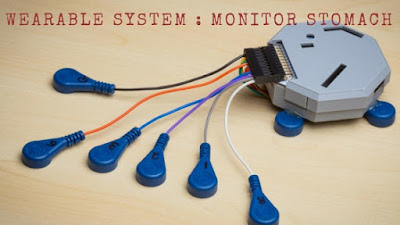Wearable system to monitor electrical activity in the stomach:
A wearable, non-invasive system has been
made to screen electrical development in the stomach over 24 hours which
essentially is like an electrocardiogram for the digestive tract. Applications
consolidate checking GI activity for understanding outside of a clinical
setting, which decreases costs. Watching for longer period of time increments
the likelihood of capturing irregular occasions. It has been found that the
stomach's electrical development changes not as it were around suppers, but in
addition in the midst of rest, taking after its possess circadian beat.
The biggest challenge was designing
algorithms that recognize and boost the stomach's electrical signals amid noise
and artifacts. This is especially difficult to do because the stomach's
electrical signals are 10 times weaker than the heart's, making them harder to
capture and analyze.
Afterwards, a modern algorithmic
pipeline was created that can clean up the information and partitioned out
stomach muscle action (for case when an individual walks), heart beats and
gastric movement, into distinctive groups of signals that do not cover. As a
result, clinicians can look at each signal independently and compare it to
others.
The gadget itself employments
off-the-shelf electrodes utilized in electrocardiograms. The gadgets and
battery are encased in a 3D printed box and associated to the electrodes, which
fit on a person's abdomen just over the stomach. The framework is currently
matched with a smart phone app that permits patients to log their meals, rest
and other exercises. The long-term objective is to plan an app that would
permit patients and doctors to see the information collected by the gadget in
real time.
Healthy individuals moreover advantage from using the gadget.
For case, competitive athletes and their coaches could screen GI action to
figure out the finest time for meals, particularly while traveling over diverse
time zones. Pregnant ladies suffering from acid
reflux and other GI issues could utilize it to screen the stomach's action
before, amid and after meals, as would the elderly. GI issues, such as
postponed purging of the stomach, are common in patients with diabetes and
Parkinson's. This innovation moves forward the administration of these
conditions as well.




Comments
Post a Comment